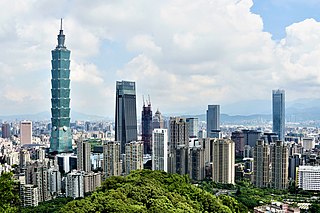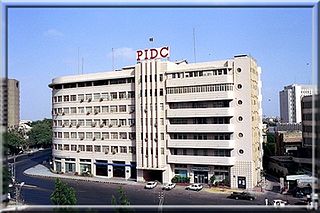
The economy of Taiwan is a highly developed free-market economy. It is the 8th largest in Asia and 20th-largest in the world by purchasing power parity, allowing Taiwan to be included in the advanced economies group by the International Monetary Fund. Taiwan is notable for its rapid economic development from an agriculture-based society to an industrialised, high-income country. This economic growth has been described as the Taiwan Miracle. It is gauged in the high-income economies group by the World Bank. Taiwan is one of the most technologically advanced computer microchip and high-tech electronics industries makers in the world.

Small businesses are types of corporations, partnerships, or sole proprietorships which have a small number of employees and/or less annual revenue than a regular-sized business or corporation. Businesses are defined as "small" in terms of being able to apply for government support and qualify for preferential tax policy. The qualifications vary depending on the country and industry. Small businesses range from fifteen employees under the Australian Fair Work Act 2009, fifty employees according to the definition used by the European Union, and fewer than five hundred employees to qualify for many U.S. Small Business Administration programs. While small businesses can be classified according to other methods, such as annual revenues, shipments, sales, assets, annual gross, net revenue, net profits, the number of employees is one of the most widely used measures.
The Renewables Obligation (RO) was designed to encourage generation of electricity from eligible renewable sources in the United Kingdom. It was introduced in April 2002, both in England and Wales and in Scotland albeit in a slightly different form: the Renewables Obligation (Scotland). The RO was later introduced in Northern Ireland in April 2005. In all cases, replacing the Non-Fossil Fuel Obligation which operated from 1990.
The pharmaceutical industry is one of the leading industries in the People's Republic of China, covering synthetic chemicals and drugs, prepared Chinese medicines, medical devices, apparatus and instruments, hygiene materials, packing materials, and pharmaceutical machinery. China has the second-largest pharmaceutical market in the world as of 2017 which is worth US$110 billion. China accounts for 20% of the world's population but only a small fraction of the global drug market. China's changing health-care environment is designed to extend basic health insurance to a larger portion of the population and give individuals greater access to products and services. Following the period of change, the pharmaceutical industry is expected to continue its expansion.

In 2022, 79.6% of Taiwan's electricity generation came from fossil fuels, 9.1% from nuclear, 8.6% from renewables, and 1.2% from hydro. Taiwan relies on imports for almost 98% of its energy, which leaves the island's energy supply vulnerable to external disruption. In order to reduce this dependence, the Ministry of Economic Affairs' Bureau of Energy has been actively promoting energy research at several universities since the 1990s.
The Taiwan Miracle or Taiwan Economic Miracle refers to Taiwan's rapid economic development to a developed, high-income country during the latter half of the twentieth century.

Pakistan Industrial Development Corporation (PIDC) is a state corporation of Pakistan working under Ministry of Industries and Production.
One Tambon One Product (OTOP) is a local entrepreneurship stimulus program designed by Thailand's former Prime Minister Thaksin Shinawatra during his 2001-2006 Thai Rak Thai government. The program aimed to support locally made and marketed products of each of Thailand's 7,255 tambons (sub-district). Drawing its inspiration from Japan's successful One Village One Product (OVOP) program, the OTOP program encourages village communities to improve the quality and marketing of local products, selecting one superior product from each tambon to receive formal branding as its "starred OTOP product". It provides both a local and national stage to the promote these products. OTOP includes a large array of local products, including traditional handicrafts, cotton and silk garments, pottery, fashion accessories, household items, and foods. After a military junta overthrew Thaksin's government in 2006 following an election cancelled for irregularities, the OTOP program was cancelled. However, it was soon revived and rebranded.

One Town, One Product (OTOP) is a promotional program of the government of the Philippines. The initiative follows a similar undertaking by the Republic of China, which launched a One Town One Product in 1989 to promote companies in Taiwan. OTOP in the Philippines aims to promote goods and products of Filipino towns, cities, and regions, and provides funding for small businesses. It is administered by the Department of Budget and Management (DBM).
Industry in Ghana accounts for about 24.5% of total GDP. However, Ghana's industrial production is rising at a 7.8% rate, giving it the 38th fastest growing industrial production in the world due to government industrialization policies.

The Ministry of Micro, Small and Medium Enterprises is the ministry in the Government of India. It is the apex executive body for the formulation and administration of rules, regulations and laws relating to micro, small and medium enterprises in India. The Minister of Micro, Small and Medium Enterprises is Jitan Ram Manjhi.

China XD Group is a Chinese state-owned power engineering company and manufacturer of electrical equipment. Established in July 1959, China XD Group was formerly known as Xi'an Electric Machinery Manufacturing Company, Xi'an XD, Xi'an Xidian, and Xi'an Electric

The Ministry of Economic Affairs is the ministry of the Republic of China (Taiwan) responsible for formulating policy and laws for industry and trade, foreign direct investment, energy, minerals, measurement standards, intellectual property, state-owned enterprises. The ministry is a cabinet level government agency of the Executive Yuan.
Swisscontact – Swiss Foundation for Technical Cooperation is a Swiss non-profit-organisation, which carries out projects aiming at reducing poverty in developing and transition countries by private sector development. It has been founded in 1959 as a politically and denominationally neutral organisation and has 60 employees in Switzerland and approximately 1,400 staff abroad. The main fields of activity are fostering skills development, small and medium enterprises, financial services and resource efficiency.
Small and medium enterprises in Mexico, generally called PyMEs, are an important segment of the Mexican economy. They are classified in two types of small and medium enterprises: family businesses and non-family businesses.
Food safety incidents in Taiwan have received international media scrutiny.

The Nepalese Ministry of Minister of Industry, Commerce and Supplies is a governmental body of Nepal to monitor and manage industries of the country.

The Small and Medium Enterprise Administration is the administrative agency of the Ministry of Economic Affairs of the Taiwan (ROC) responsible for small and medium-sized enterprises-related affairs.

The "Organic Market Development in Ukraine 2012–2016, Phase II" project is implemented by the Swiss Research Institute of Organic Agriculture (FiBL) and foster the growth of small and medium enterprises in the Ukrainian organic food sector by developing organic and regional food supply chains.
The Ministry of SMEs and Startups is a ministry of the Republic of Korea, established in July 2017 by the Moon Jae-in government. It succeeds the former Small and Medium Business Administration. The headquarters are located in Sejong City, Sejong. As of February 2021, Lee Young, a member of the National Assembly and People Power Party, has been appointed as the South Korean Minister of SMEs and Startups.










